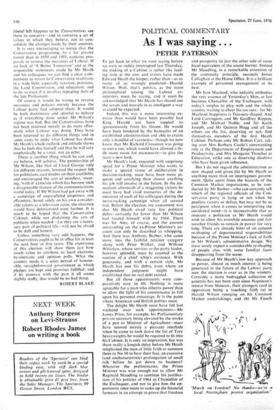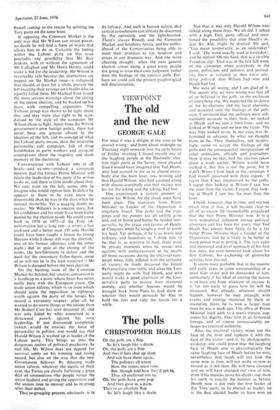POLITICAL COMMENTARY
As I was saying . . •
PETER PATERSON
To get back to what we were saying before we were so rudely interrupted last Thursday, the making of a Cabinet is rather like feed-
ing time at the zoo, and events have made Edward Heath the keeper, rather than—as so
many of us wrongly predicted—Harold Wilson. Well, that's politics, as the more philosophical among the Labour ex-
ministers must be saying, and it must be acknowledged that Mr Heath has shared out the scraps and morsels in as intelligent a way as could be expected.
Indeed, this was a more interesting ex- ercise than would have been possible had King Harold not been toppled so ignominiously from his throne. He would have been hindered by the barnacles of an established administration and able to create only a handful of vacancies—though we now know that Mr Richard Crossman was going to move out, which would have allowed a lit- tle more room for manoeuvre—to give the team a new look.
Mr Heath's task, executed with surprising speed for a Prime Minister who wants to make a special virtue of deliberation in decision-making, must have been more pi- quant and satisfying than almost anything his job will involve in the future. In the im- mediate aftermath of a staggering victory he must have had vivid memories of the de- meanour of each of his colleagues during the nerve-racking campaign when all seemed lost. Before the election, my assessment was that Mr Heath owed very few political debts—certainly far fewer than Mr Wilson had loaded himself with by 1964. There was Sir Alec, of course, and the amount outstanding on the ex-Prime Minister's ac- count can only be described as whopping. And there was Anthony Barber, who came more into the faithful retainer category along with Peter Walker, and William Whitelaw, whose services to the party leader, however splendid, must be counted as the routine of a chief whip's existence. With generosity, and with a certain style, Mr Heath has met his debts, even where an independent judgment might have established that no real debt existed.
But all those appointments were com- paratively easy to fill. Nothing is more agreeable for a man who inherits power than • to allow the light of his countenance to fall upon his personal entourage. It is the point where American and British politics meet.
The delight Mr Heath must have felt last weekend over such appointments—Mr James Prior, for example, his Parliamentary private secretary being elevated by the stroke of a pen to Minister of Agriculture—must have seemed merely a pleasant interlude when he came to look down the list of Tory heavyweights he would be required to fit into his Cabinet. It is only an impression, but was there really a longish delay before Mr Heath telephoned the men of little faith to summon them to No 10 to hear their fate, an excessive (and uncharacteristic) prolongation of small talk before he got down to business? Whatever the preliminaries, the Prime Minister was wise enough not to allow Mr Reginald Maudling to continue his justifica- tion of his policies of 1964 as Chancellor of the Exchequer, and not to give him the op- portunity once more to stoke up the financial furnaces in an attempt to prove that freedom
and prosperity lie just the other side of some fiscal equivalent of the sound barrier. Instead Mr Maudling, in a remarkable extension of the continuity principle, succeeds James
Callaghan at the Home Office. It is a brilliant example of personnel management at its best.
Mr lain Macleod, who unfairly embodies
the very essence of Yesterday's Men, at last becomes Chancellor of the Exchequer, with today's surplus to play with and the whole country waiting to cheer his tax cuts: for Mr Macleod, happiness is Treasury-shaped. And Lord Carrington, and Mr Geoffrey Rippon, and Mr Michael Noble, and Sir Keith Joseph, and Mr Quintin Hogg and all the others on the list, deserving or not, find themselves members of the first Heath Cabinet. Perhaps only Mr Robert Carr, tak- ing over Mrs Barbara Castle's unrewarding role at the Department of Employment and Productivity, and Mrs Margaret Thatcher at Education, strike one as deserving shadows who have been given substance.
But I do not regard the administration as now shaped and given life by Mr Heath as anything more than an interregnum govern- ment. Quite apart from the hazards of the Common Market negotiations, to be con- ducted by Mr Barber—who can certainly tell which of the regional officials of the Con- servative party is lying or not when he predicts victory or defeat, but may not be so percipient when it comes to interpreting the occidental mind—it is inconceivable that so insecure a politician as Mr Heath would wish to allow his erstwhile enemies and fair weather friends to remain in power for very long. There are already hints of an autumn re-shaping of departmental responsibilities because of the Prime Minister's lack of faith in Mr Wilson's administrative design. We must surely expect a considerable re-shaping of people also, with some familiar faces disappearing from the scene.
Because of Mr Heath's low key approach to power, almost as much interest is being generated in the future of the Labour party now the election is over as in the winners. Certainly a more bedraggled collection of generals has not been seen since Napoleon's retreat from Moscow, their strongest card in opposition being a touching faith (a) in Harold Wilson reneging on his Common Market undertakings, and (b) Mr Enoch
'March on London? No thanks---we're a local Nottingham protest organisation.' Powell coining to the rescue by splitting the Tory party on the same issue.
If opposing the Common Market is the only way that Mr Wilson can retain power, no doubt he will find a form of words that allows him to do so. Certainly the feeling within the Labour party on this issue precludes any possibility that Mr Roy Jenkins, with or without the agreement of Mr Callaghan and Mr Denis Healey, could make a bid for the leadership. Mr Wilson is reasonably safe because the alternatives are suspect on the Market issue—a safeguard that should, at least for a while, prevent the left exacting their revenge on a leader who so signally failed them. Mr Michael Foot issued the most serious warnings about the timing of the recent election, and he backed up his fears with compelling arguments. The Tribune group was shown to be right about this, and they were also right to be scan- dalised by the style of the campaign Mr Wilson chose to fight. Apart from the Wilson government's own foreign policy, there has never, been any greater affront to the idealism of the left, and its concept of what the Labour party means, than the miserable personality cult campaign, full of limp handshakes to party workers and arrogant assumptions about the stupidity and short memory of the electorate.
Conversations with Labour MPS at all levels—and ex-MPs—produce a consensus opinion that the former Prime Minister will retain the leadership of his party if he wishes to do so, and there is little doubt about that. No one, even on the left, seems able to imagine who would replace him. In defeat he appears to them to be even more in- dispensable than he was in the days when he seemed invincible. Yet a nagging doubt re- mains: Mr Wilson's is a success story, but his confidence and his pride have been badly dented by the election result. He could come back in 1974 or 1975—if the Tory ad- ministration has a long run—a wiser, a less cocksure and a better man. (If only Harold could have been taught a lesson by losing Huyton while Labour still won the election,' one of his former admirers said the other night.) But in spite of the closing of the ranks, the bewilderment in defeat and the need for the customary father-figure, some of us will not be in the least surprised if Mr Wilson is dumped before the next election.
On the burning issue of the Common Market his belated, but sincere, conversion is a handicap to a party whose heart has never really been with the European cause. On trade union reform, which is an issue which should unite the opposition in righteous wrath against the party of the bosses, his record is extremely suspect: after all, he wanted to do worse things to the unions than Mr Robert Carr has ever dreamed of, and was only foiled by what amounted to a threatened putsch against his own leadership. If one discounted completely (which would be unwise) the force of personality in politics, one would say that Harold Wilson is washed up as leader of the Labour party. This brings us into the dangerous realms of political psychiatry. In real life, Mr Wilson does not depend for survival solely on his winning and losing record, but also on the way that the new Government behaves. By delaying trade union reform, whatever the merits of their case, the Tories are clearly forfeiting a great deal of ammunition (the people versus the union leaders) and giving the opposition and the unions time to recover and to re-group after their defeat.
That re-grouping process, obviously. is in its infancy. And such is human nature, that certain consolations can already be discerned by the optimistic and the light-hearted. There's always Powell, and the Common Market, and Southern Africa, and the unlike- lihood of the Conservatives being able to meet their promises to cut taxation and prices in any dramatic way. And one more cheering thought: when the next general election comes along, a great many people are going to trust their own judgment, rather than the findings of the opinion polls. Per- haps we could call the process psephological self-determination.































 Previous page
Previous page